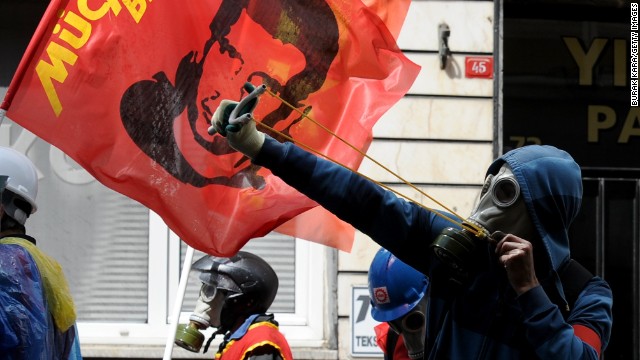Turkey bans May Day rallies, uses tear gas, water cannon on demonstrators

Turkish security forces barricaded the commercial center of Istanbul in an attempt to stop May Day celebrations from taking place in the city's iconic Taksim Square.
Police fired plastic pellets and used tear gas and water cannon in an attempt to disperse May Day demonstrators who tried to defy the ban and reach the city center.
Protesters responded by throwing stones and bottles and shooting fireworks at riot police. Similar clashes erupted in the Turkish capital Ankara and the port city of Izmir.
Turkish authorities went to great lengths to prevent people from gathering in Istanbul, Turkey's largest city. Citing security threats by extremist groups, the government shut Istanbul's subway system, stopped many commercial ferry services between the European and Asian halves of the city, and blocked vehicular traffic on some of Istanbul's busiest roads.
"Intelligence units have received information that illegal terrorist organizations and their extensions are going to resort to violence against security forces. This situation would create circumstances that would not only disrupt public order and security but also seriously threaten the rights and freedoms of our citizens," the Istanbul governor's office announced in a written statement released Wednesday night.
The governor's office also justified the ban, arguing that May Day rallies would hurt Istanbul's image as a tourist destination
"Taksim Square and the surrounding area are not suitable for high attendance gatherings and demonstrations," the governor's office wrote.
"In Taksim vehicular and pedestrian traffic is intense and the area has great tourism potential with 24/7 tourist hotels, so negative developments in this area would negatively impact the country economy, tourism potential and the marketing image of our country."
But the shut-down of the city center left many foreign tourists bewildered, as police turned them away from barricades. Some visitors could be seen dragging suitcases through empty and barricaded streets in a confused search for hotels.
"Closed," a police officer said, turning away an elderly European couple trying to enter Taksim Square.
The sprawling pedestrian area was all but deserted throughout the day on Thursday, with the exception of security forces, a handful of journalists, and wandering flocks of pigeons.
For decades, May Day, or International Workers Day, has been a day of tension between leftist Turkish labor unions and security forces. Taksim Square holds particular importance to leftist parties, because dozens of people were killed there in a May 1, 1977 rally in which gunfire triggered a deadly stampede.
In 2011 and 2012, the ruling Justice and Development Party allowed leftist groups to rally in Taksim for the first time in decades. The gatherings were festive and peaceful, decorated with giant posters of those who died in 1977.
But in 2013, the government banned the annual rally, sparking a day of violence that has spiraled into the most politically turbulent year of anti-government protests Turkey has seen in more than a decade.
Turkey's Prime Minister Recep Tayyip Erdogan has been in power since his party first won parliamentary elections in 2002. He frequently denounces his critics, accusing them of being terrorists bent on overthrowing his government. His supporters argue Turkey has grown more democratic during the Erdogan era. They point to his party's sweeping victory in local elections last March, when Justice and Development Party candidates won at least 43% of the national vote.
"We have moved away from a state that saw its citizens as a threat," said Deputy Prime Minister Besir Atalay in a speech earlier this week.
But many human rights groups and press freedoms organizations argue the Erdogan government has grown increasingly intolerant of public displays of dissent in recent years.
This week, the U.S.-based human rights organization Freedom House downgraded classification of Turkey from "Partly Free" to "Not free."
"Constitutional guarantees of freedom of the press and expression are only partially upheld in practice, undermined by restrictive provisions in the criminal code and the Anti-Terrorism Act," Freedom House said.
They also said, "Turkey remained the world's leading jailer of journalists in 2013."
Comments
Post a Comment